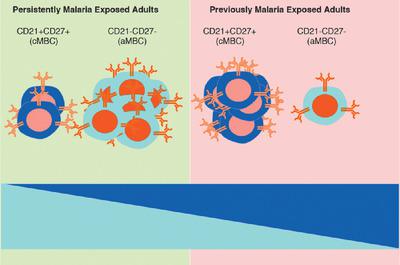当前位置:
X-MOL 学术
›
Eur. J. Immunol.
›
论文详情
Our official English website, www.x-mol.net, welcomes your
feedback! (Note: you will need to create a separate account there.)
Malaria exposure drives both cognate and bystander human B cells to adopt an atypical phenotype.
European Journal of Immunology ( IF 4.5 ) Pub Date : 2020-03-29 , DOI: 10.1002/eji.201948473 Racheal Aye 1, 2 , Henry J Sutton 2 , Eunice W Nduati 1, 3 , Oscar Kai 1 , Jedida Mwacharo 1 , Jennifer Musyoki 1 , Edward Otieno 1 , Juliana Wambua 1 , Philip Bejon 1, 3 , Ian A Cockburn 2 , Francis M Ndungu 1, 3
European Journal of Immunology ( IF 4.5 ) Pub Date : 2020-03-29 , DOI: 10.1002/eji.201948473 Racheal Aye 1, 2 , Henry J Sutton 2 , Eunice W Nduati 1, 3 , Oscar Kai 1 , Jedida Mwacharo 1 , Jennifer Musyoki 1 , Edward Otieno 1 , Juliana Wambua 1 , Philip Bejon 1, 3 , Ian A Cockburn 2 , Francis M Ndungu 1, 3
Affiliation

|
Atypical memory B cells (aMBCs) are found in elevated numbers in individuals exposed to malaria. A key question is whether malaria induces aMBCs as a result of exposure to Ag, or non‐Ag‐specific mechanisms. We identified Plasmodium and bystander tetanus toxoid (TT) specific B cells in individuals from areas of previous and persistent exposure to malaria using tetramers. Malaria‐specific B cells were more likely to be aMBCs than TT‐specific B cells. However, TT‐specific B cells from individuals with continuous exposure to malaria were more likely to be aMBCs than TT‐specific B cells in individuals from areas where transmission has ceased. Finally, sequences of BCRs specific for a blood stage malaria‐Ag were more highly mutated than sequences from TT‐specific BCRs and under strong negative selection, indicative of ongoing antigenic pressure. Our data suggest both persistent Ag exposure and the inflammatory environment shape the B‐cell response to malaria and bystander Ags.
中文翻译:

疟疾暴露促使同源和旁观人类 B 细胞采用非典型表型。
在暴露于疟疾的个体中发现非典型记忆 B 细胞 (aMBC) 的数量增加。一个关键问题是疟疾是否会由于暴露于 Ag 或非 Ag 特异性机制而诱发 aMBC。我们确定了疟原虫和旁观者破伤风类毒素 (TT) 特异性 B 细胞,来自使用四聚体的先前和持续暴露于疟疾的区域的个体。疟疾特异性 B 细胞比 TT 特异性 B 细胞更可能是 aMBC。然而,来自持续接触疟疾的个体的 TT 特异性 B 细胞比来自传播已停止地区的个体的 TT 特异性 B 细胞更可能是 aMBC。最后,血液分期疟疾-Ag 特异性 BCR 序列的突变程度高于 TT 特异性 BCR 序列,并且在强负选择下,表明持续的抗原压力。我们的数据表明,持续的 Ag 暴露和炎症环境塑造了 B 细胞对疟疾和旁观者 Ags 的反应。
更新日期:2020-03-29
中文翻译:

疟疾暴露促使同源和旁观人类 B 细胞采用非典型表型。
在暴露于疟疾的个体中发现非典型记忆 B 细胞 (aMBC) 的数量增加。一个关键问题是疟疾是否会由于暴露于 Ag 或非 Ag 特异性机制而诱发 aMBC。我们确定了疟原虫和旁观者破伤风类毒素 (TT) 特异性 B 细胞,来自使用四聚体的先前和持续暴露于疟疾的区域的个体。疟疾特异性 B 细胞比 TT 特异性 B 细胞更可能是 aMBC。然而,来自持续接触疟疾的个体的 TT 特异性 B 细胞比来自传播已停止地区的个体的 TT 特异性 B 细胞更可能是 aMBC。最后,血液分期疟疾-Ag 特异性 BCR 序列的突变程度高于 TT 特异性 BCR 序列,并且在强负选择下,表明持续的抗原压力。我们的数据表明,持续的 Ag 暴露和炎症环境塑造了 B 细胞对疟疾和旁观者 Ags 的反应。









































 京公网安备 11010802027423号
京公网安备 11010802027423号